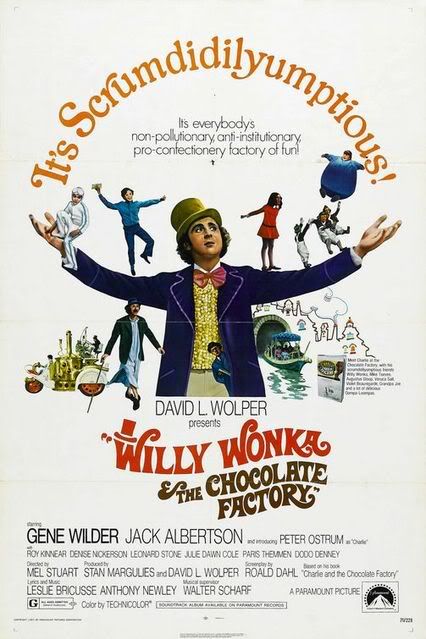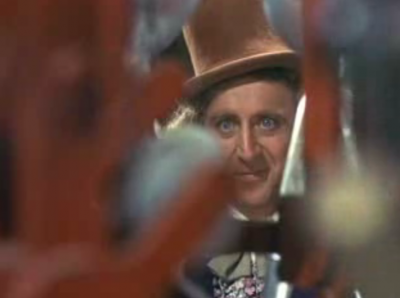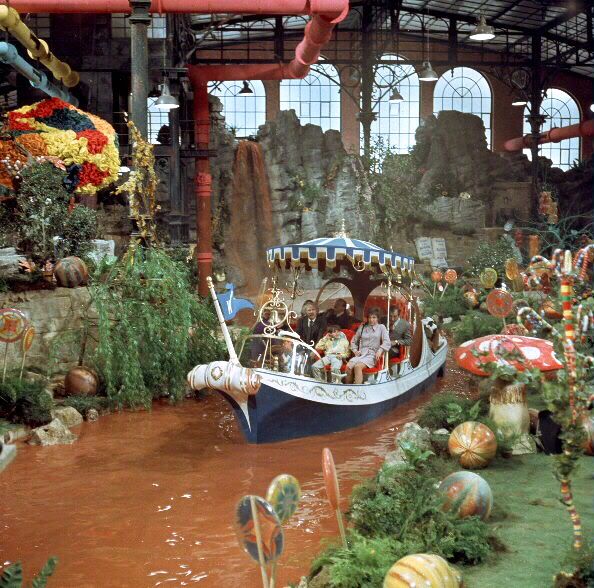Willy Wonka and the Chocolate Factory

Willy Wonka and the Chocolate Factory
Director: Mel Stuart
Starring: Gene Wilder, Jack Albertson, Peter Ostrum
1971
Who didn’t love this movie as a kid? Filled with chocolate and candy and the most bizarre factory ever committed to film, it’s a child’s dream. The opening credit sequence, with shot after shot of ooey gooey chocolate, is enough to make my mouth water just from the thought. However, unlike most movies that you love as a kid, this one manages to stand up to the transition to adulthood.
Charlie Bucket (Ostrum) is very poor. When the fantastic and reclusive candy maker Willy Wonka (Wilder, in perhaps his most iconic role) announces a contest to win admittance to his factory and free chocolate for life, Charlie is elated, and after being initially disappointed, finds one of the five elusive Golden Tickets. He and his Grandpa Joe (Albertson) encounter a myriad of wondrous and terrible things in Wonka’s strange factory, but ultimately, Charlie proves he is a good child, pure of heart, and wins Wonka’s final prize.
Based on the famous children’s novel by Roald Dahl, Dahl also penned the screenplay for this, the first adaptation of his work. Dahl’s novels, favorites of mine when I was young (really, who DIDN’T love his work?), are all bizarrely supernatural stories, where everyday children somehow become involved in extraordinary events. What sets his stories apart from all the other children’s novels about the supernatural, though, is Dahl’s supremely honed sense of the sinister. Dahl’s works don’t shirk from fear, realizing instead that it is important children encounter safe manifestations of their fears in order to learn to deal with them. I was fascinated by Dahl’s work for that very reason. He wrote the best villains. The Witches is indelibly inked in my mind, despite the fact that I haven’t read the work for two decades because of its completely terrifying and thus effective villains.
I mention all of this to make a point about Willy Wonka. It’s a children’s movie that transcends most other children’s movies because of the fear, the threats, the sinister nature of the film. Wait, isn’t it about candy? Well, yes, but it’s more than that. Willy Wonka focuses on a fantasy world that happens to be built around candy. Unlike most children’s films’ fantasy worlds, this is a world where the rules are not only capricious but possibly vicious. There is evil and danger lurking even in the most beautiful, candy-colored room, which, in turn, creates an atmosphere of unease. There is great delight in the film - I don’t want to paint this as an evil movie - but the delight is heavily counterbalanced by a palpable sense of danger. The psychedelic and dangerous boat ride is proof enough of that, let alone the fact that Charlie is initially approached outside Wonka’s factory by a man with a cart full of knives!
The danger, the unease, the viciousness are all embodied and channeled through the film’s main character, Willy Wonka. In this role, Wilder fully inhabits his character in the most unnerving of ways. It’s telling how strong of a performance it is when you consider that Wonka himself does not appear until nearly halfway through the film. He is absent at first, but then his presence is so conspicuous, so all-consuming, that you leave the film thinking he was in absolutely every scene. Wilder’s Wonka is an evil genius, an insane criminal mastermind, but one who cloaks his crimes under the pretense of selecting morally good people over morally bad people. When a criminal selects for the good and against the bad, we don’t consider him a criminal, but when selecting against bad people involves plunging them down pipes, sending them off to a gigantic juicer, or pushing them through to an incinerator that may or may not be fired up that day, he’s still a criminal. Wilder’s Wonka is wily, slippery, and profoundly temperamental. He is singing one moment, and yelling the next. He has next to no patience for his guests, and is supremely unconcerned about any negative consequences of their actions. How odd that he is the star, then. He is far more a puppet master than a hero; but, after all, that is what makes this movie so interesting. A dark, mischievious Puck-like figure at the helm of an entire world is wonderful, thrilling, and frightening, all at the same time.

Undoubtedly, Wonka is the central figure of the film, but as mentioned earlier, he does not make his first appearance until about 45 minutes in. The first portion of the film, often overlooked in favor of the bizarre candy factory segment, deals with the world’s search for Wonka’s Golden Tickets. A series of absolutely delightful vignettes about the fervor of the search paint a portrait of a world absolutely obsessed with Wonka and his candy. A rich woman’s husband has been kidnapped, and the ransom demand is a box of Wonka chocolates; she must think about it. A computer expert designs a program to tell where the Golden Tickets are, only to have the program tell him he is cheating. A psychiatrist is disdainful of his client until the client says he dreamed the location of a Golden Ticket. All these whimsical mini-stories, completely unrelated to the overall characters’ stories, serve as charming build-up to the entrance to the factory.
The songs in the film are almost all ear-worms of the worst kind, guaranteed to be stuck in your head all evening long. “Who can make the sunshine?” you’ll hum, imagining Bill the candy merchant in his wonderful little corner candy shop. Or maybe you’ll joyously sing along with Grandpa Joe when he exclaims, “I’ve got a Golden Ticket!” Then there’s the Oompa-Loompas, the charming yet also slightly fiendish workers at Wonka’s factory that serve as the Greek Chorus of the film, singing “Oompa, Loompa, Doompity Doo.” Or best of all, sing along with Wilder as he belts out, “If you want to view paradise / Simply look around and view it!” in the beautiful “Pure Imagination.” Infinitely singable, and very fun.
The sets are pure whimsy. Wonka’s factory was constructed entirely on backlots, lending a superficiality to it which works. There isn’t meant to be anything natural about Wonka’s factory, so it’s fitting that it all looks fake. The colors are bright and bold, and there are oddities around every corner. The lickable wallpaper (“The snozzberries taste like snozzberries!”), the seizure-inducing room full of angles and dizzying walls, and the shrinking room are only shown for a few moments, but they’re more than memorable. And, it’s worth mentioning, this was all achieved without reliance on CGI special effects.

Who DOESN'T love a set like this? Pure childhood fantasy!
I loved this movie as a child, and I love it as an adult, and not purely for sentimental reasons. It holds its own as a legitimate film, full of whimsy and menace, musical merriment and threatening danger. Children can handle danger if adults let them, and more often than not, they’re better for it. After seeing all the horrible things that happen to the horrid, obnoxious little children in this film, I know I was more inspired as a child to be good like Charlie Bucket, because maybe, just maybe, I’d get to see Willy Wonka’s Chocolate Factory!